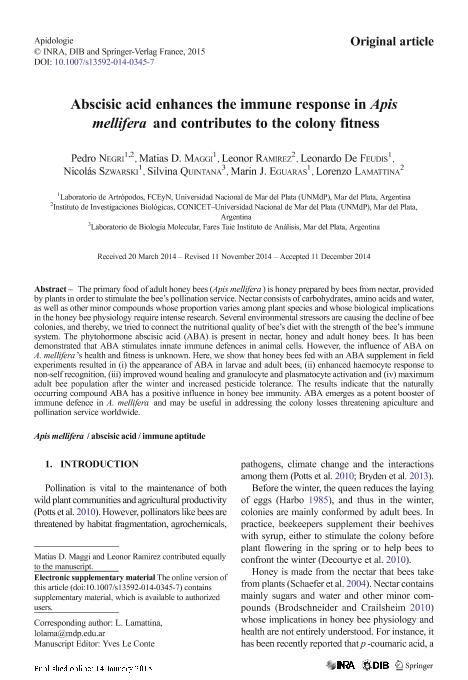Artículo
Abscisic acid enhances the immune response in Apis mellifera and contributes to the colony fitness
Negri, Pedro ; Maggi, Matías Daniel
; Maggi, Matías Daniel ; Ramírez, Leonor
; Ramírez, Leonor ; de Feudis, Leonardo; Szawarski, Nicolás
; de Feudis, Leonardo; Szawarski, Nicolás ; Quintana, Silvina
; Quintana, Silvina ; Eguaras, Martin Javier
; Eguaras, Martin Javier ; Lamattina, Lorenzo
; Lamattina, Lorenzo
 ; Maggi, Matías Daniel
; Maggi, Matías Daniel ; Ramírez, Leonor
; Ramírez, Leonor ; de Feudis, Leonardo; Szawarski, Nicolás
; de Feudis, Leonardo; Szawarski, Nicolás ; Quintana, Silvina
; Quintana, Silvina ; Eguaras, Martin Javier
; Eguaras, Martin Javier ; Lamattina, Lorenzo
; Lamattina, Lorenzo
Fecha de publicación:
06/2015
Editorial:
EDP Sciences
Revista:
Apidologie
ISSN:
0044-8435
Idioma:
Inglés
Tipo de recurso:
Artículo publicado
Clasificación temática:
Resumen
The primary food of adult honey bees (Apis mellifera) is honey prepared by bees from nectar, provided by plants in order to stimulate the bee’s pollination service. Nectar consists of carbohydrates, amino acids and water, as well as other minor compounds whose proportion varies among plant species and whose biological implications in the honey bee physiology require intense research. Several environmental stressors are causing the decline of bee colonies, and thereby, we tried to connect the nutritional quality of bee’s diet with the strength of the bee’s immune system. The phytohormone abscisic acid (ABA) is present in nectar, honey and adult honey bees. It has been demonstrated that ABA stimulates innate immune defences in animal cells. However, the influence of ABA on A. mellifera’s health and fitness is unknown. Here, we show that honey bees fed with an ABA supplement in field experiments resulted in (i) the appearance of ABA in larvae and adult bees, (ii) enhanced haemocyte response to non-self recognition, (iii) improved wound healing and granulocyte and plasmatocyte activation and (iv) maximum adult bee population after the winter and increased pesticide tolerance. The results indicate that the naturally occurring compound ABA has a positive influence in honey bee immunity. ABA emerges as a potent booster of immune defence in A. mellifera and may be useful in addressing the colony losses threatening apiculture and pollination service worldwide.
Palabras clave:
ABSCISIC ACID
,
APIS MELLIFERA
,
IMMUNE APTITUDE
Archivos asociados
Licencia
Identificadores
Colecciones
Articulos(CCT - MAR DEL PLATA)
Articulos de CTRO.CIENTIFICO TECNOL.CONICET - MAR DEL PLATA
Articulos de CTRO.CIENTIFICO TECNOL.CONICET - MAR DEL PLATA
Articulos(IIB)
Articulos de INSTITUTO DE INVESTIGACIONES BIOLOGICAS
Articulos de INSTITUTO DE INVESTIGACIONES BIOLOGICAS
Citación
Negri, Pedro; Maggi, Matías Daniel; Ramírez, Leonor; de Feudis, Leonardo; Szawarski, Nicolás; et al.; Abscisic acid enhances the immune response in Apis mellifera and contributes to the colony fitness; EDP Sciences; Apidologie; 46; 4; 6-2015; 542-557
Compartir
Altmétricas



